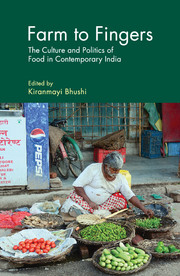Book contents
- Frontmatter
- Dedication
- Contents
- List of Figures and Tables
- Preface
- 1 Introduction
- 2 The Making of ‘Edible Animal Source Foods’ and its Contemporary Reality in Delhi
- 3 Appropriating the Cow: Beef and Identity Politics in Contemporary India
- 4 Eating Akhuni in India
- 5 Health, Standardization and ‘Bengali’ Sweets
- 6 Treating Children, Feeding Junk Food: An Inquiry into a Middle Class Project
- 7 Diaspora Dish: Cooking, Writing, and Creating Identities in Food-blogs
- 8 Measuring Hunger: Debates on an ‘Adequate’ Diet in Colonial North India
- 9 Managing Food: India's Experience with the Public Distribution System
- 10 Food Sovereignty: The Future of Food
- Contributors
- Index
3 - Appropriating the Cow: Beef and Identity Politics in Contemporary India
Published online by Cambridge University Press: 05 July 2018
- Frontmatter
- Dedication
- Contents
- List of Figures and Tables
- Preface
- 1 Introduction
- 2 The Making of ‘Edible Animal Source Foods’ and its Contemporary Reality in Delhi
- 3 Appropriating the Cow: Beef and Identity Politics in Contemporary India
- 4 Eating Akhuni in India
- 5 Health, Standardization and ‘Bengali’ Sweets
- 6 Treating Children, Feeding Junk Food: An Inquiry into a Middle Class Project
- 7 Diaspora Dish: Cooking, Writing, and Creating Identities in Food-blogs
- 8 Measuring Hunger: Debates on an ‘Adequate’ Diet in Colonial North India
- 9 Managing Food: India's Experience with the Public Distribution System
- 10 Food Sovereignty: The Future of Food
- Contributors
- Index
Summary
Introduction
To international onlookers, debates over cattle slaughter and beef consumption might have seemed like a sideshow to the main issues (corruption, the economy and women's safety high among them) that dominated the 2014 general election in India. The fact that they registered at all, however, points not only to the continuing symbolic, material and affective significance of beef to life in the sub-continent, but also to the levels of ambivalence and controversy that still surround a meat apparently long since rejected by the majority of Indians. During the election campaign, Narendra Modi, leader of the Hindu nationalist Bharatiya Janata Party (BJP) and the soon-to-be prime minister, was harsh in his criticism of the outgoing government's subsidies and tax-breaks for slaughterhouses that had, he claimed, led to the mass killing of cows and buffaloes. ‘Those at the Centre want a “Pink Revolution”,’ Modi told a rally in Bihar. ‘When animals are slaughtered, the colour of their flesh is pink. Animals are being slaughtered and taken to Bangladesh. The government in Delhi is giving subsidies to those who are carrying out this slaughter.’
To many of those outside India, Modi's objections might have seemed relatively uncontroversial. India is, after all, well known for its wide-spread vegetarianism and veneration of the cow, while meat eating more generally has traditionally been interpreted, by anthropologists as well as by casual onlookers, as a marker of low or impure caste status among Hindus (Beteille 1996: 56-60; Marriott 1968; Mayer 1960). The split between vegetarianism and meat-eating has been flagged as a key marker of distinction between high and low (Seneviratne 1992: 195; Srinivas 1966: 23-24; Dumont 1970: 146-151), with meat eaters further ordered on the basis of whether or not they eat beef (Chigateri 2008: 20) and, in some cases, over whether they eat the meat of the buffalo and that of the cow. Both types of meat may be rendered as ‘beef ‘ in English, or as goddu māmsam in Telugu – the mother tongue of most of my interlocutors in India. I shall introduce those I worked with more fully later, but in short they comprised mainly Christians, Hindus and Muslims from rural Andhra Pradesh and the state capital, Hyderabad.
- Type
- Chapter
- Information
- Farm to FingersThe Culture and Politics of Food in Contemporary India, pp. 58 - 79Publisher: Cambridge University PressPrint publication year: 2017
- 1
- Cited by



